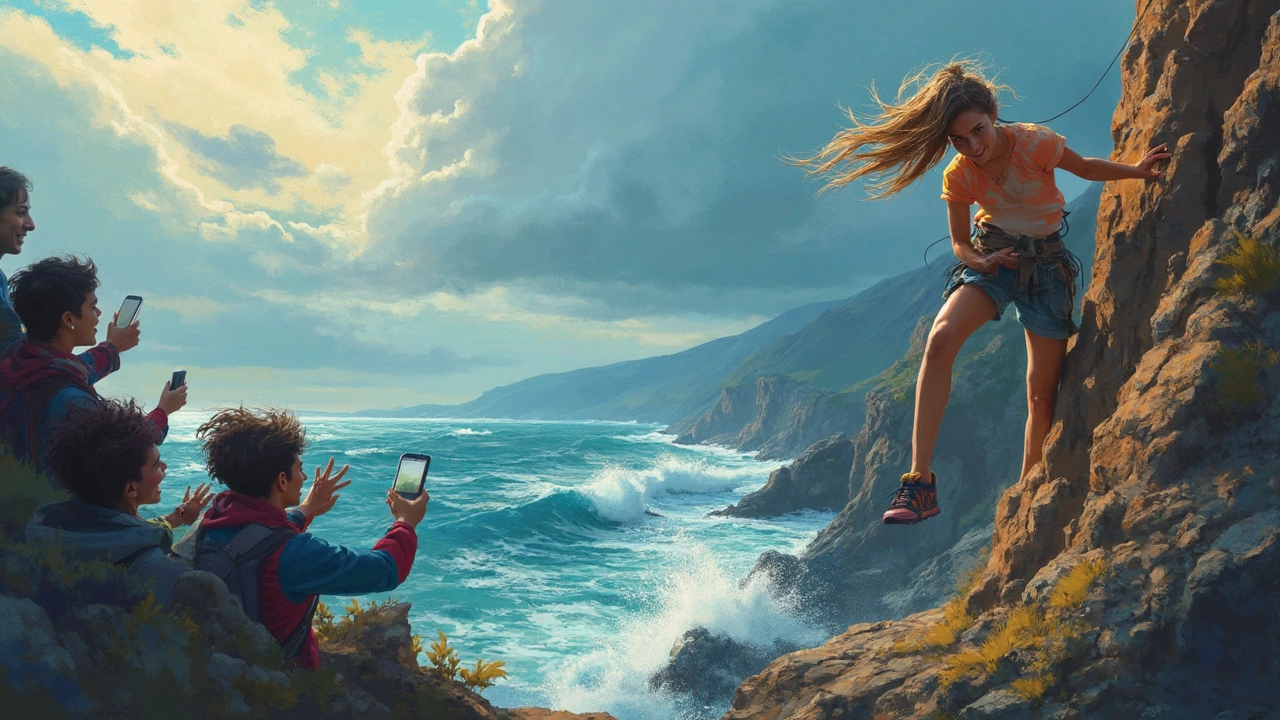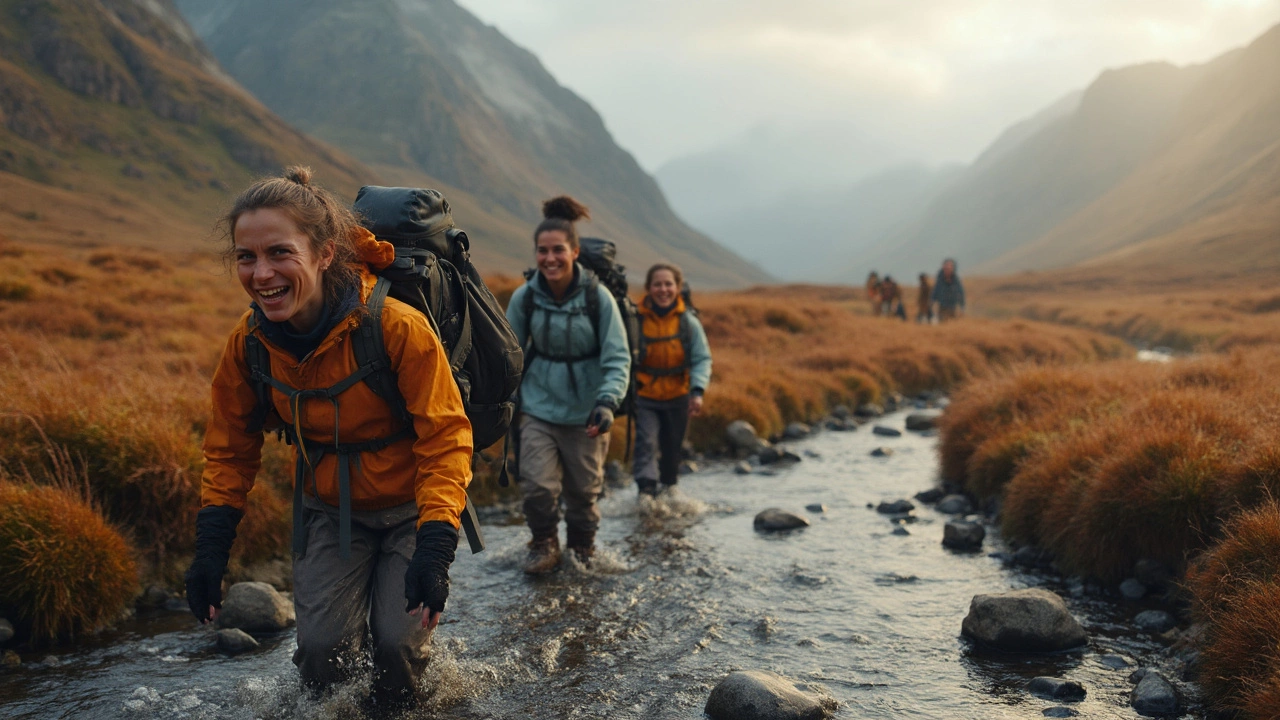You ever notice how just thinking about ziplining through a rainforest or hiking across a glacier wakes you right up? That's why adventure holidays are blowing up. They're nothing like sitting by a pool and scrolling your phone — they push you out of your comfort zone, and honestly, that feeling can be pretty addictive.
Adventure trips give you stories you actually want to tell, not just photos that look like everyone else's vacation. It's about doing something real: climbing a mountain, paddling down rapids, or even learning to surf if you’ve never tried it. These holidays aren’t just for athletes or adrenaline junkies, either. If you can walk a few miles or swim a few laps, there’s probably an adventure trip out there with your name on it.
Here’s something not everyone realizes: adventure holidays help you recharge in ways a basic resort trip can't. Being a little nervous — like, 'Can I make it to the top of this hill?' — flips a switch in your brain. You end up noticing more, laughing harder, and, honestly, sleeping better at night because you actually got tired in the best way.
- What Makes Adventure Holidays Different?
- Surprising Benefits of Adventure Travel
- Tips for Planning Your Own Adventure Trip
- Who Should Consider an Adventure Holiday?
What Makes Adventure Holidays Different?
The thing about adventure holidays is they flip the script on what most people picture when they hear "vacation." You’re not just kicking back at a hotel or dragging yourself to the same old tourist spots. Instead, you’re getting physically involved, challenging yourself, and making memories that actually stick.
First off, adventure trips are usually about being out in nature or tackling something active. We’re talking hiking, biking, kayaking, climbing, or snowboarding in places like the Alps, Peru, or New Zealand. And yeah — it’s a workout, but it’s also oddly fun. The activities themselves become the main event, not just an add-on to fill empty hours.
Another thing: these trips tend to offer a sense of achievement. According to Adventure Travel Trade Association’s 2022 report, 67% of adventure travelers say the sense of accomplishment is their favorite part of these journeys. It’s a totally different vibe than just chilling by a pool. You might trek four hours to reach a secret beach, or wake up at 4 a.m. to catch sunrise from the top of a volcano — that’s a serious bragging right.
Adventure holidays also force you off the beaten path. Instead of following a crowd, you’re discovering spots most tourists never see. You end up meeting locals, trying real food, and sometimes even learning a new skill (hello, open-water diving licenses or survival workshops!).
- Adrenaline: Nature hikes, rafting, and biking pump your heart and wake up your brain.
- Immersive culture: Smaller groups and remote areas mean more connection — with both people and places.
- Personal growth: Trying something new (even if you fail) feels good — and it lasts way longer than a tan.
Most adventure travel companies keep group sizes small (usually 6-15 people), so it never feels like one of those massive package tours. If you want real experiences and a sense of “whoa, did I just do that?,” adventure holidays are where it’s at.
Surprising Benefits of Adventure Travel
Here’s the thing: adventure holidays do more for you than just provide a cool story. Science backs it up. One study from the University of Michigan found that being outdoors and moving around actually boosts your memory and attention span by over 20%. That's just from a walk in the park—imagine what trekking through Patagonia could do.
Adventure travel can make you healthier without you even noticing. When you’re paddling a kayak or hiking up a ridge, you’re getting a serious workout but it doesn’t feel like one. You’re too busy looking at amazing stuff, or just trying not to fall in the river. There's even more:
- Your stress drops. People who take active travel breaks report way less stress after getting back. It’s not magic or some fake wellness hype—the combo of moving, new scenery, and sometimes a little adrenaline can drop your cortisol levels fast.
- You build confidence on the fly. Ever tried something you never thought you could do—like make it up a steep mountain pass or finally stand on a surfboard? You land back home realizing you can probably handle more than you thought, even in regular life.
- Your social circle often grows. Group adventure holidays are an easy way to meet new people because, let’s face it, nothing helps break the ice like surviving a wild whitewater run together. Even solo adventurers say they make quick friends when things get real.
- There's a real sense of achievement. Adventure travel gives you clear wins. You see the trail’s end, reach the summit, or finally spot that rare animal. That sense of accomplishment stays with you and helps motivate you back home, too.
To put a few benefits into numbers, check out the table below. These stats from adventure travel companies and surveys show what people experience after a trip:
| Benefit | Percentage of Travelers Reporting |
|---|---|
| Reduced Stress Levels | 87% |
| Feeling More Confident | 71% |
| Meeting New People | 65% |
| Improved Sleep | 53% |
So next time you’re debating where to go, remember that adventure holidays can leave you feeling sharper, stronger, and maybe even with a couple of new friends.

Tips for Planning Your Own Adventure Trip
Thinking about your first adventure holiday? Planning is where the magic happens, and skipping the basics usually backfires. Here’s how people actually get it right the first time.
- Pick the Right Spot: Start by asking what kind of ‘adventure’ works for you. Some places are famous for epic hikes (like Peru’s Inca Trail), others for world-class surfing (think Bali), and some pack it all in (New Zealand’s Queenstown, for example, has pretty much every outdoor thrill you can think of).
- Time It Right: Weather can make or break a trip. If you’re heading to Nepal to trek, October and November have the clearest skies. For whitewater rafting in Costa Rica, go May to November when rivers are wildest. Double-check local seasons before you book anything.
- Get the Gear: Not everything needs to be top-of-the-line, but gear basics matter. Going climbing? Don’t skimp on shoes. Biking? Helmet and padded shorts make all the difference. Most outfitters rent or include special equipment, but check and make a packing list for yourself too.
- Know Your Limits: Adventure is about pushing yourself, but sign up at the right level. Look for trips with detailed skill ratings. Beginners should avoid itineraries with all-day hikes, or Class V rapids. Honest trip reviews on travel forums can help you find what’s doable.
- Safety First: Crazy stat: according to a 2023 Outdoor Industry Association report, 94% of guided adventure trips completed safely with no serious incidents. Still, always check outfitter safety records, and buy travel insurance that covers adventure sports. Let someone back home know your plan just in case.
- Pace Yourself: First timers, don’t overbook. Bodies need breaks even on adventure holidays. Plan a chill day between harder activities and stay hydrated—this goes double if you’re in high altitudes or hot places.
| Activity | Best Season | Essential Gear |
|---|---|---|
| Hiking in Patagonia | Nov–Mar | Layered clothing, sturdy boots |
| Surfing in Bali | Apr–Oct | Rash guard, board shorts |
| Climbing Kilimanjaro | Jan–Mar/Jun–Oct | Cold weather gear, trekking poles |
Final tip: start with something just outside your comfort zone, not so far that it turns into a struggle. Most people end up hooked—and start looking for their next trip before this one is even over.
Who Should Consider an Adventure Holiday?
You don't need to climb Everest or run ultra-marathons to go on adventure holidays. A lot of people think they’re not “outdoorsy” enough, but the truth is, as long as you’re up for a bit of challenge and open to new experiences, you’re probably a good fit for an adventure trip. Most organizers offer trips for different fitness levels, and some of the best trips mix active days with plenty of downtime.
So, who’s this really for? Here’s a breakdown:
- First-timers: New to adventure travel? There are beginner-friendly options, like guided hikes, gentle kayaking, or cycling tours that go at your pace.
- Families: Lots of parents look for something special for the kids, and activities like ziplining, wildlife safaris, or snorkeling work for almost any age.
- Solo travelers: You actually meet people faster when you’re on a group hike than at a museum. About 55% of solo travelers in a recent Intrepid Travel survey said adventure was their top reason to travel alone.
- Groups of friends: If you're tired of the same old city breaks, try a rafting or mountain biking trip. You’ll get some epic memories instead of just another night out.
- Couples: Nothing brings you closer like getting through a rafting rapid together or trying stand-up paddleboarding for the first time.
Activity companies usually label trips by difficulty, so you can pick something that fits. A lot of tours are rated from “easy” (think scenic walks or moderate cycling) to “tough” (summit climbs or multi-day treks). If you have health issues, check with a doctor and let the tour operator know — they’re used to handling all sorts of situations.
Also, a quick tip: nearly 80% of people booking adventure holidays say feeling a bit nervous is what makes it fun. It’s normal to feel some butterflies before paragliding or canyoning, but that’s the good stuff. That’s where real memories are born.
